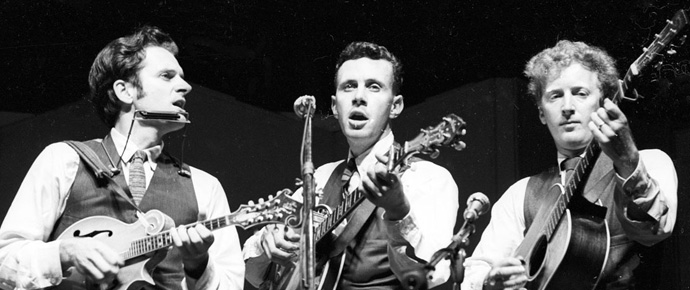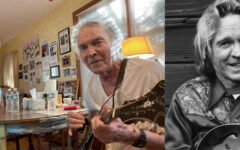
On this day …..
On the Sunday evening of May 25, 1958, the New Lost City Ramblers (NLCR) played a half hour set on John Dildine’s weekly folk music radio show on Washington, DC’s WASH-FM radio station, thus making their first public performance.
One of the numbers the then nameless trio performed that night was a mountain dance tune called Colored Aristocracy – prior to this they had only played together for about 30 minutes.
The founding members were Tom Paley (born in New York City, March 19, 1928; died September 30, 2017), John Cohen (born in Queens, New York City, August 2, 1932) and Mike Seeger (born in New York City, August 15, 1933; died August 7, 2009).
Another New Yorker Tracy Schwarz (born on November 13, 1938) replaced Paley, who left the group in 1962, due to a disagreement about adopting a more professional approach, and a political issue.
Cohen is a musicologist, photographer and film maker. His 1962 film, High Lonesome Sound, is synonymous with the music of Appalachia, featuring, as it does old-time musician from Kentucky, Roscoe Holcomb.
Paley was a guitarist, banjo and fiddle player who had been playing music from about 1951. Two years later he recorded his first album Folk Songs of the Southern Appalachian Mountains. He said this of playing with Cohen and Seeger ….
“When we formed The New Lost City Ramblers it was the kind of thing I’d been doing for quite a few years…. It didn’t feel particularly revolutionary to me but I understood we had quite an impact on young people like Dylan.”
Seeger, a member of the famed Seeger family of folk musicians and folklorists, was a distinctive singer and an accomplished musician who played autoharp, banjo, fiddle, dulcimer, guitar, mouth harp, mandolin, dobro, jaw harp and pan pipes.
Briefly, the group drifted apart during the latter half of the 1960s, with Schwarz and Seeger performing with different musicians, and together they helped to form the short-lived Strange Creek Singers.
Jointly, the NLCR distinguished themselves by focusing on the traditional playing styles that they heard on old 78rpm records of musicians recorded during the 1920s and 1930s, many of whom had earlier appeared on the multi-disc Anthology of American Folk Music.
The pioneering American folk band brought the sounds of genuine old-time string band music of those such as Gid Tanner and his Skillet Lickers; the Fruit Jar Drinkers; Sam and Kirk McGee; the Kessinger Brothers; Carolina Tar Heels and other early country music recording artists to urban audiences, many of which had looked on that as a relief from the more-bland commercial music.
A contemporary old-time string band, the NLCR were pioneers in the revival of Appalachian mountain music during the folk music revival of the late 1950s and early ’60s. They were the most popular, most influential, even the most important first-generation revival band, playing the southern sounds that they heard.
Also, by including these styles in their repertoire, the versatile NLCR helped to introduce bluegrass music, western swing and Cajun sounds to a receptive Northern audience.
The made many television appearances, had many successful tours, and played at the popular Newport Folk Festival.
In 1966 they toured in Europe, including England, Germany, Denmark, Sweden and Switzerland – with the Stanley Brothers, Roscoe Holcomb, Cousin Emmy, Cyprien Landreneau, and others.
The following year the NLCR returned to England to play at the Royal Albert Hall, London.
The NLCR has been cited by many as a source and influence, among them Bob Dylan and The Grateful Dead, Bela Fleck and the North Carolina Chocolate Drops among others.
This enjoyable short film, Goin’ to Cade’s Cove, made in 1968 shows Cohen, Seeger and Schwarz in their element.
The songs/tunes performed are The Green Grass Grows All Around, Three Men Went a-Hunting, Poor Old Dirt Farmer (composed by Tracy Schwarz), Foggy Mountain Top, Old Granny Hare, Little Betty Ann, In the Pines, Black Jack Davy and Ain’t a-Gonna Get No Dinner Here Tonight.
In June 2003 Cohen, Seeger, Schwarz and Paley, who was living in England at the time, played a reunion concert at the Shaw Theatre in London. The event was sponsored by the Cultural Section at the US Embassy.
Listen to Part One…
… and Part Two:
The NLCR made its last performance on July 30, 2009, at the Appalachian String Band Festival, an annual musical gathering also referred to as simply “Clifftop,” held annually on a mountain top in the New River Gorge area of West Virginia. Eight days later, Mike Seeger died from cancer.
They recorded extensively, as would be expected in a career of such longevity. The vast majority were released by Moses Asch’s Folkways label.
- The New Lost City Ramblers (1958) (Folkways Records)
- The New Lost City Ramblers Vol. II (1959) (Folkways)
- Songs From the Depression (1959): see [2] (Folkways)
- Old-Timey Songs For Children (1959) (Folkways)
- The New Lost City Ramblers Vol. III (1961) (Folkways)
- Tom Paley, John Cohen, Mike Seeger Sing Songs of The New Lost City Ramblers (1961)
- The New Lost City Ramblers (1961)
- Earth Is Earth Sung by The New Lost City Bang Boys (1961) (Folkways)
- The New Lost City Ramblers Vol. 4 (1962) (Folkways)
- American Moonshine & Prohibition (1962) (Folkways)
- The New Lost City Ramblers Vol. 5 (1963) (Folkways)
- Gone to the Country (1963)
- Radio Special # 1 (1963)
- The New New Lost City Ramblers with Tracy Schwarz: Gone to the Country (1963) (Folkways)
- String Band Instrumentals (1964) (Folkways)
- Old Timey Music (1964)
- Rural Delivery No. 1 (1965) (Folkways)
- Remembrance of Things to Come (1966) (Folkways)
- Modern Times (1968) (Folkways)
- The New Lost City Ramblers with Cousin Emmy (1968) (Folkways)
- On the Great Divide (1973) (Folkways)
- 20th Anniversary Concert (1978)
- 20 Years-Concert Performances (1978)
- Tom Paley, John Cohen, and Mike Seeger Sing Songs of the New Lost City Ramblers (1978) (Folkways)
- Old Time Music (1994)
- The Early Years, 1958-1962 (1991) (Folkways)
- Out Standing In Their Field-Vol. II, 1963-1973 (1993) (Smithsonian Folkways)
- There Ain’t No Way Out (1997) (Folkways)
- 40 Years of Concert Performances (2001)
- 50 Years: Where Do You Come From? Where Do You Go? (2009) (Smithsonian Folkways)
Bluegrass Today is very grateful for the alert from Richard Hawkins, Bluegrass Ireland Blog.
The life of the NLCR is documented in an hour-long film, Always Been a Rambler, written, directed and edited by Yasha Aginsky and released by Arhoolie.
You can watch a three-minute trailer here.
In October 2010 the University of Illinois Press published Ray Allen’s award-winning exploration of the cultural impact of the NLCR: Gone to the Country: The New Lost City Ramblers and the Folk Music Revival.
The New Lost City Ramblers were nominated for two Grammy awards; for Best Traditional Folk Recording for the album 20th Anniversary Concert (in 1986) and Best Traditional Folk Album There Ain’t No Way Out (1997).







